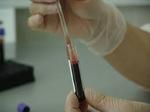In her acceptance speech, Hillary Clinton proclaimed that she believed in science.
How is this even a political issue? When did believing in science become an option?
To believe in science is to believe in evidence that is verifiable and reproducible. To believe in science is to trust a process that embraces doubt, risk-taking, innovation. The U.S. was founded by a pioneer spirit that championed risk-taking. For most of our history it's been part of our collective DNA. We must recapture that spirit.
The denial of scientific research coincides with the dismissal of creativity as frivolous. Both come at a time when being science literate is a necessity, and when the need for creative solutions is needed for, well, everything. I'm not sure there was ever a time in our history that this trend would not be troubling. But, I am certain that there could not be a worse moment for this trend to take hold.
Everyone loses when we allow scientific research to fall into political camps. What is needed is to include as many of our students as possible, and as early as possible, in science education. We must cast as large a net as possible if we are to have any hope of generating the pool of home-grown talent who will become our best resource for a secure nation and a healthy economy.
I'd like to believe that as a nation we can rise above the current divisive political climate and recognize the need for public investment in science. But I lack faith. We don't even want to talk to people who have different ideas than our own. We don't even want to get news from places that don't support our beliefs. We avoid risking having our minds changed, even by verifiable and reproducible evidence.
Sure, science has become more complex and more difficult to understand. So has national security. But that is no reason to abandon science. It's the reason to double down on science and math education with a sense of urgency and purpose.
In 1957, the Soviet Union launched Sputnik II and ended any illusion that the United States was keeping up with the Russians. We responded by passing the National Defense Education Act and adapting school curriculums to increase our focus on math and science. The results included our successful space program, the first moon landing, and countless accidental discoveries that led to innovations and improvements to every facet of our lives.
Scientific research results in advances that support our economy and improve our security. Our global competitiveness is improved when even our non-scientists are more scientifically literate. When all our citizens are able to navigate the links between science and math and almost everything else -- from housing to healthcare to farming to energy production to manufacturing to security -- an increase in productivity and innovation will follow.
In the end, it will be from our nation's classrooms that emerge the great innovators of technology, the wise stewards of the environment, the creators of that next vaccine, and the next keepers of our national security. Let's make sure that we provide opportunities to those next dreamers to step forth and show us things we have yet to imagine.




